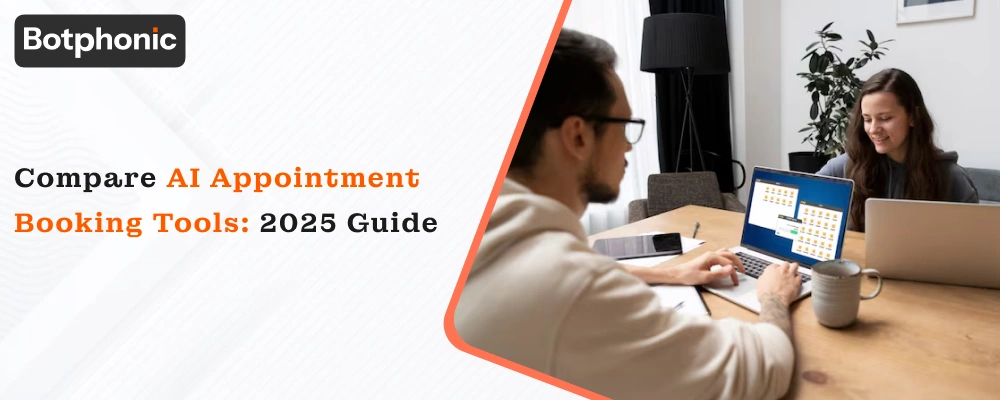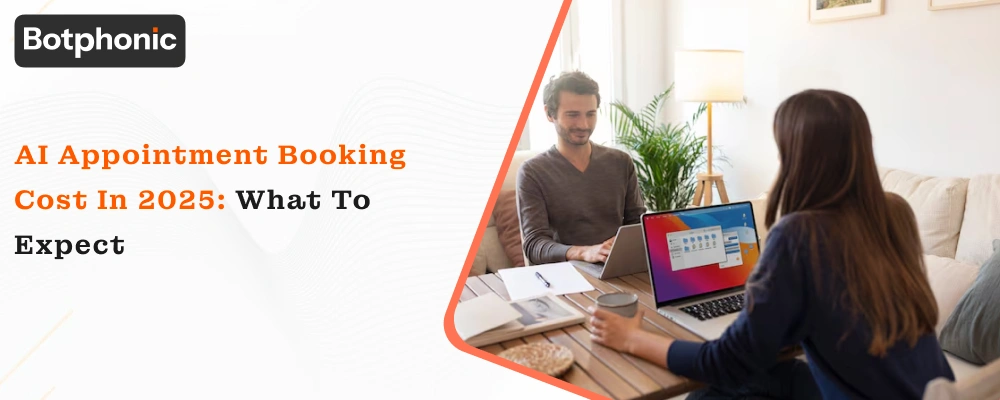
Summarize Content With:
Summary
This blog will provide the data about the AI appointment booking cost in 2025. In addition, readers will be acquainted with the workings of AI, the factors affecting pricing, and the process of finding the most suitable solution for their business.
Key Takeaways
- Figure out what factors influence the AI appointment booking cost in 2025.
- Get familiar with AI booking’s standard pricing models and the factors that affect the cost of AI.
- Gain insight into the actual price ranges and ROI benefits of various industries.
- The benefits you get from using Botphonic AI include being able to save time and maximise the number of your bookings quickly and effectively.
Introduction
Think of a situation where your company operates 24/7 without missing any orders. That is precisely the function of modern-day AI booking systems. The executives perform tasks such as communicating, scheduling, confirming, and even following up, all without any human intervention.
2025 has turned out to be the year when businesses, big or small, can avail themselves of such intelligent automation. However, one question still lingers: What is the cost of an AI appointment booking?
Businesses need a clear understanding of AI appointment booking costs to make informed decisions about business tech investments. Every organisation will appreciate this blog, as it deals not only with pricing but also with models, industrial areas, and ROI in an easy-to-understand way.
What Is AI Booking and How Does It Work?
AI booking is an automated system that uses AI to handle appointments, calling, and reminders. It is like a smart assistant that can understand what you say or write. It can handle a client’s tasks, schedule meetings, and even keep calendars up to date.
AI bookings do their job instantly. Essentially, it is all accomplished through the API, which integrates AI appointments with services such as Google Calendar and CRM. This collaboration or integration minimises human intervention and, on the whole, saves time every week. By 2025, AI voice technology will be more human-like and a significant trend.
Moreover, AI booking systems may also handle tasks such as confirming appointments, sending reminders, and automatically allowing customers to change appointments. Consequently, more customers attend their appointments and show their appreciation for the services.
Example: A clinic operating an AI appointment system can effortlessly manage 100 or more requests per day without needing to add staff.
In 2025, AI scheduling applications will continue to utilise machine learning to forecast consumer trends and make the most efficient use of available appointment times. As an example, the software will be able to find the busiest times for bookings, prioritise clients with the greatest value, and adjust the available times flexibly to prevent overlapping appointments.
The system is being extended to employ speech emotion recognition technology, improving the adaptability of the interaction. Such a technique will automatically raise the customer’s level of satisfaction, consequently increasing sales.
How AI Booking Simplifies Tasks?
| Task Type | Handled by AI Booking | Time Saved |
| Appointment scheduling | Yes | 3–4 hours/day |
| Reminder calls | Yes | 2 hours/day |
| Rescheduling | Yes | 1 hour/day |
AI Appointment Booking Cost: Common Pricing Models
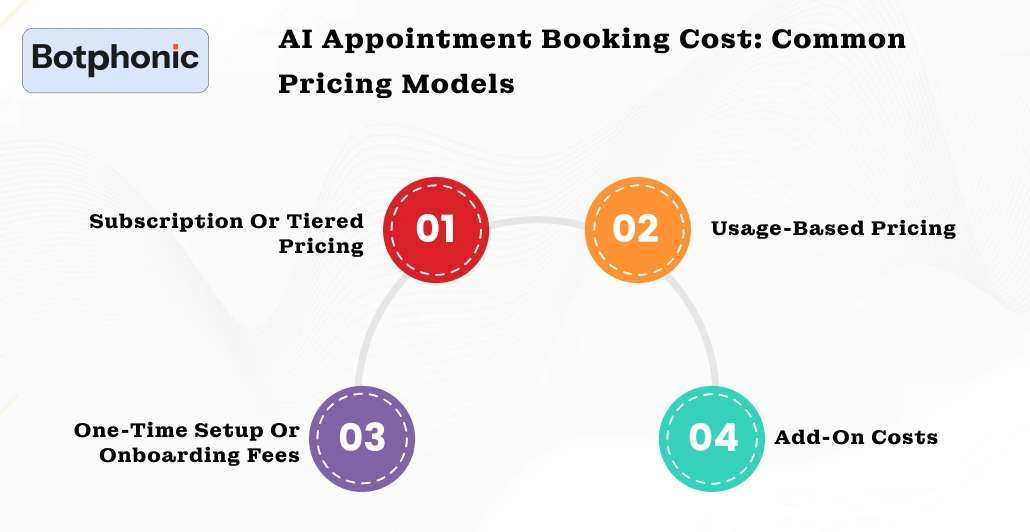
The AI appointment booking cost, which is to be understood, is supported by the pricing models. Each business pays differently, as per their usage and features.
1. Subscription or Tiered Pricing
This is a model that offers fixed monthly or yearly plans. In this case, you will be charged for the number of bookings or calls. Small plans with limited features typically start at a lower price. In the higher tiers, you gain access to additional features, including analytics and integrations. This makes the budgeting process more straightforward, and many companies fall for it.
This business pattern works well in companies whose cycle is at least somewhat foreseeable. They will then have the opportunity to take on what aligns more closely with their operations, allowing them to expand on a larger scale to meet their future business needs. Some providers may use AI-powered analytics dashboards to make subscription upgrades demonstrate real-time ROI tracking.
2. Usage-Based Pricing
Some providers charge a fee per call, per minute, or per booking. This pricing model is suitable for businesses with a seasonal demand. In that case, you pay only for what you use.
This method allows small enterprises to buy only what they need, thus avoiding excessive costs for unutilized periods. Consequently, it allows new companies to experience setting up AI booking systems without committing to a specific period of time.
3. One-Time Setup or Onboarding Fees
It is a fact that advanced AI booking systems require some kind of setup or training; therefore, the user must make a one-time payment for configuration or voice model setup.
Most of the time, the fees are meant to cover the adjustment of the AI model to fit the company, training the staff, and integration testing to ensure that the deployment is hassle-free. The initial costs might seem quite large, but the company will experience fewer post-launch errors and technical issues, allowing them to quickly recoup their investment.
4. Add-On Costs
Additional services, such as multilingual voice, CRM integration, or analytics, can increase the AI appointment booking cost.
Average AI Appointment Booking Cost in 2025
The AI appointment booking cost in 2025 is a variable that is affected by your business size and the industry it belongs to. The average data shows that:
- Within the range of $30 to $100 per month, small businesses can afford the AI services.
- The monthly expenses of medium-sized companies are estimated to be between $100 and $400.
- If enterprises are not satisfied with their technology, they might decide to spend $500 or more per month to upgrade their systems.
The total expense is distinctly related to the number of calls or appointments. Voice-based solutions are generally more expensive than their chat-only counterparts, but at the same time, they offer greater value.
Automation leads to a 14.5% increase in selling effectiveness and a 12.2% decrease in overhead costs.
Key Factors That Influence AI Booking Pricing
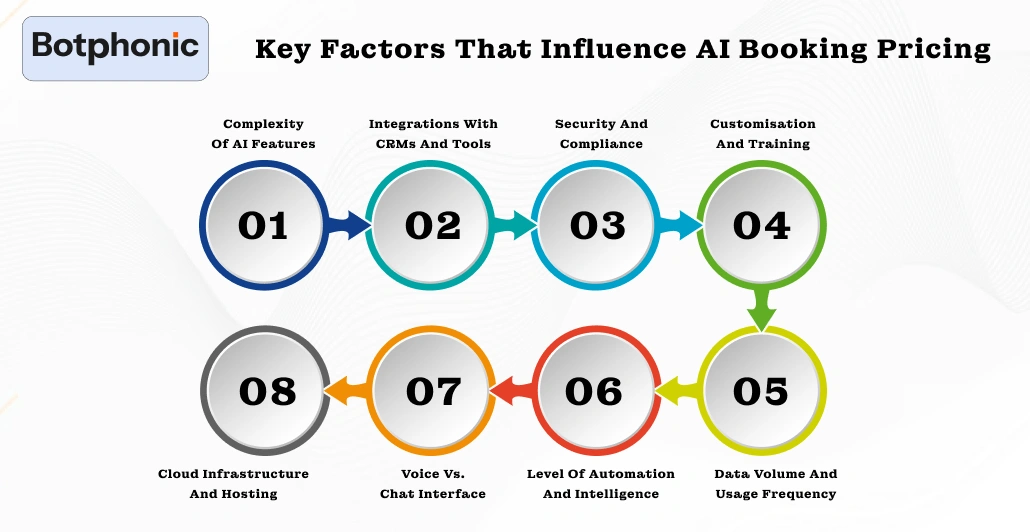
Many factors will determine the pricing of an AI appointment booking. What are the most important factors that matter?
1. Complexity of AI Features
Voice comprehension, speech tone, and normal dialogues raise the cost. Systems with advanced voice AI have to use better hardware and models.
2. Integrations with CRMs and Tools
The price of an AI booking increases slightly if it is integrated with software like Salesforce or HubSpot due to the added complexity.
3. Security and Compliance
In the case of sensitive data, such as healthcare, you will require HIPAA or GDPR compliance. This will increase the AI appointment booking cost but will also protect your brand.
4. Customisation and Training
Custom voice models, domain-specific knowledge, and team training also feel the influence of cost.
5. Data Volume and Usage Frequency
AI systems that are in charge of processing huge volumes of customer data or handling high call volumes will incur higher costs. The more bookings or calls you execute, the higher the computational power and storage required. Some providers charge based on API usage, data storage, or the number of monthly interactions. Businesses with thousands of daily appointments, such as healthcare chains or salons, should expect a higher cost structure.
6. Level of Automation and Intelligence
Basic AI systems only schedule activities and send reminders. However, advanced ones offer contextual understanding, follow-up communication, and predictive scheduling. Systems that employ deep learning to study customer habits and propose the most suitable slot for you to work with are the ones that are most valuable; nevertheless, they add to the cost of the product due to their higher computational needs.
7. Voice vs. Chat Interface
Voice-based AI systems are pricier than text-based chatbots, as they have higher development, processing, and maintenance requirements. The most complex features, such as natural voice generation, real-time language translation, and emotion detection, all lead to an increase in the AI appointment booking cost, but these features also greatly contribute to user engagement and conversion rates.
8. Cloud Infrastructure and Hosting
In the case of a cloud-hosting AI booking solution, there are three factors that influence the price: the hosting provider, the data bandwidth, and the uptime guarantees. There is usually a higher price for the top service providers like AWS and Google Cloud that can guarantee 99.9% uptime and data redundancy, but they ensure the system’s reliability and scalability in return.
Every unanswered call can be a customer you lose. Let this not happen anymore.
Have a live demo scheduled today.AI Appointment Booking Cost by Industry
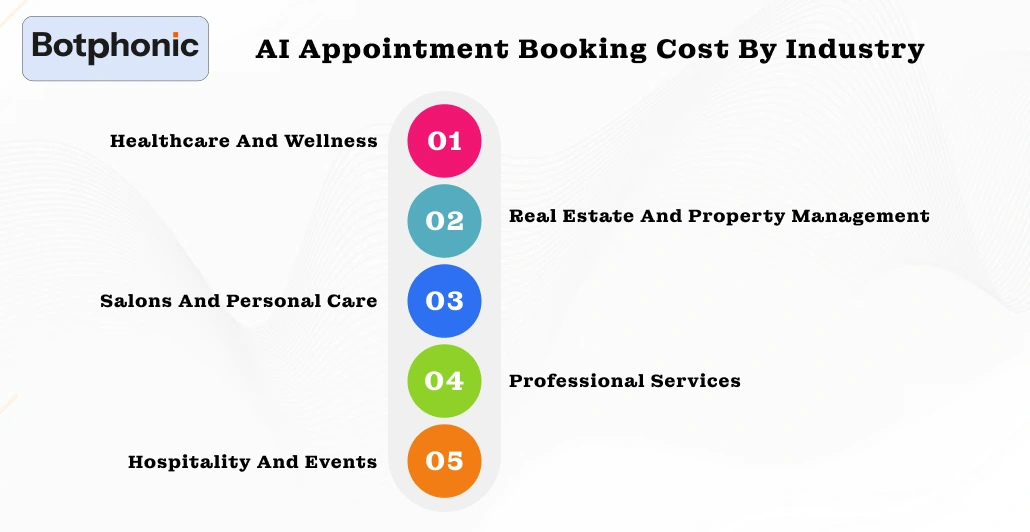
The modes for using AI booking vary greatly in different industries. How does the pricing differ? Let’s find out.
1. Healthcare and Wellness
Healthcare facilities depend on AI machines that are precise and reliable. Generally, the price is around $100 per month or even more due to standard needs and high contact rates.
Healthcare providers must use systems that comply with HIPAA for the security and confidentiality of patients’ data. Clinics incorporate AI in automating appointment scheduling, sending reminders, and managing cancellations.
Several factors, such as demand, safety, and regulations, make healthcare AI expensive. Patient calls include voice-based AI, which is a part of the total cost. In addition to communication via phone, some automation for insurers on claims is done.
2. Real Estate and Property Management
AI real estate is very helpful in customer calls, scheduling, and follow-up work. It can have a pricing range of between $80 and $300 per month.
AI is the best assistant for handling property tour bookings and customer service in real estate activities. AI-powered systems are changing the market because they allow agents to be always available, even when they’re handling other calls. The tools that work with CRM, like Zillow or Salesforce, make the work easier, but the cost is also higher. By using AI technology, the number of agency clients engaged daily can increase without losing touch with each agency’s current listings.
3. Salons and Personal Care
Using the AI system, salons can quickly secure their appointments through AI booking. The basic price is between $30 and $70 per month.
AI-powered chatbot solutions have found a perfect niche in the beauty industry, where their main function is to book and reschedule appointments and send reminders. The systems may encourage customers to write reviews and give feedback by sending appointment messages after services are delivered. The overall low cost of AI is mainly attributed to moderate call volumes.
The integration with Google Calendar or POS software facilitates daily scheduling with less hassle. One of the advantages of chat-based AI for small salons is that it can get customers to engage in quick online dialogues.
4. Professional Services
One factor contributing to the $100–$400 per month expenses of law firms, consultancies, and agencies is the complexity of their business.
Artificial intelligence appointment booking is primarily used to automate client consultations and project meetings for professional service providers. They may require integration with the document management system as well as with the CRM tools.
Legal and financial firms always prioritise security and confidentiality, which, in turn, causes prices to go up. These systems can comprehend industry-specific terminologies and styles of client communication with the help of customised AI training.
5. Hospitality and Events
Event and hotel administrators use AI booking to juggle the needs of hundreds of guests. AI appointment booking for them is anywhere between $200 and $600 per month.
Hotels rely on AI for room reservations and guest check-in/out, especially when guests’ inquiries are escalated. Event planners can use AI to book attendees, vendors, or venues efficiently. Multi-user support and real-time syncing are two of the reasons why these systems tend to be more expensive. Additionally, AI tools can be combined with online payment methods for booking deposits, making it easier and safer for customers, but this also adds a cost.
ROI and Value: How to Calculate AI Booking Returns
Every investment should have a good outcome. The ROI of AI appointment booking costs is very high if you can calculate it accurately.
1. Time Savings vs. Staff Costs
AI booking can handle most of the work and will reduce the cost of missed calls. Even if your staff spends 20 hours weekly on booking appointments.
2. Increased Bookings and Fewer No-Shows
Since AI booking sends reminders, customers are likely to show up more often. Even with a 10% increase in attendance, you can still make more profits.
3. ROI Example
If your AI booking saves 60 staff hours monthly at $15/hour, that’s $900 saved. So, if your AI system costs $150/month, your ROI is very high.
4. Payback Period
The majority of enterprises manage to regain their AI appointment booking cost within a period of 2 to 3 months after they commence using it.
Comparing AI Booking Platforms
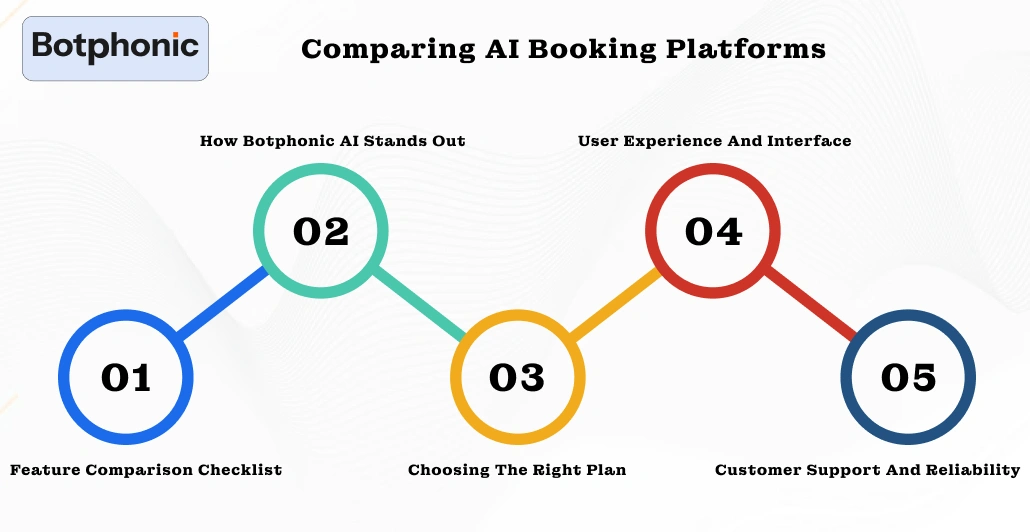
Before you pick a system, you should compare the prices and features carefully.
1. Feature Comparison Checklist
One can expect features like real-time scheduling, CRM sync, analytics, voice recognition, and multilingual support. These features can work wonders in making AI booking very effective.
Also, look for easy integration, data security, and reliable customer support. A good platform should be able to perform reminders, confirmations, and reports without additional setup.
2. How Botphonic AI Stands Out
Botphonic AI includes a natural voice, smart understanding, and simple integration. It provides up-to-date analytics and is communicative in various languages. Thus, enterprises can grow with the help of the implementation of productivity results and the lowering of manual bookings.
Botphonic AI is different with its natural voice, fast start, and multi-language support. It provides transparent pricing, easy CRM integration, and accurate real-time analytics.
3. Choosing the Right Plan
Look for a plan that matches your size as well as the number of bookings. Try it out on a small scale, then grow with your expansion.
Small start, performance check and then business growth leading to a further period-prolonged plan upgrade. Choose a plan that offers a long-term value balancing price, features, and scalability.
4. User Experience and Interface
Try to find an operating system with ease of use and an attractive visual presentation. A simple dashboard is the key for your team to quickly process bookings without technical training. A great design plays a vital role in securing customer loyalty and in lowering mistakes.
5. Customer Support and Reliability
Always choose a provider that is available day and night and whose services are hardly ever interrupted. Besides, efficient problem-solving and trustworthy services are indispensable to your AI booking being functional at all times.
Conclusion
AI appointment booking cost in 2025 revolves around features, size, and customisation. Intelligent AI call assistant is now acting like human assistants. They save time, lower the chance of mistakes, and escalate the customer experience.
Botphonic AI offers the most cost-effective and efficient solution. Its state-of-the-art voice technology and automation make businesses book more in less time.
When you measure ROI, it will make you realise that the value far exceeds the cost. Start small, test results and scale fast.
